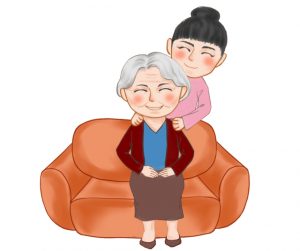Advantages and Disadvantages of an Extended Family System: A Family is basically made of Nuclear and extended Family, the nuclear family also known as elementary family consists of only the Father, Mother, and Children, while the extended family is a family which extends beyond the nuclear family and consists of both the nuclear family and relatives such as Uncles, Aunts, Cousins, and Grandparents and other people connected by blood or non-blood relatives such as In-laws, Half siblings and adopted children.
An extended family system is a system of extended family, and in this article we shall be looking at the features, advantages and disadvantages of an extended family system.

Recommended: How to be a good mother and wife
What Is An Extended Family System?
An extended family system is a complex family structure which consists of two or more adults either connected by marriage or by blood living together in the same house and working towards a common goal such as raising the children and keeping up with household duties. An extended family includes Grandparents, Uncles, Aunts, Cousins, Nieces, Nephews and other relatives living together and contributing towards the livelihood of each other.

A modified extended family system now includes family members and relatives living apart from each other but still contributing regularly to the livelihood of each other through their Financial contributions, material gifts or otherwise, but traditionally an extended family system just includes family members and relatives living together and performing the same function towards ensuring the functionality of the family.

Recommended: How to be a good dad and father in the family
An extended family system is common in Asia, Southern Europe, Asia, Africa and Middle belt and it is usually practiced because it is more economical, mutually beneficial, and offers greater family security. An extended family system possesses the following features:
a. In an extended family system, there are numerous adults in the family who are not the parents of the children
b. In an extended family system, these adults often play a parent like role and contribute to providing for the family financially or otherwise.
c. In an extended family system, there is an increased sharing of cultural and cross generational family values.
d. An extended family system provides stability for the children, especially when their parents are separated
e. In an extended family system there is usually better assistance in the upbringing and training of children.

Also see: Roles played by Children in the family
Advantages (Merits) of An Extended Family System
The following are the advantages of an extended family system:
1. It is Economical: An extended family system is economical as it helps saves resources and promotes pooling of resources thereby reducing the financial burden on one person as all adults in the family contributes in one way or the other to the livelihood of the family.
2. It promotes Unity: When people are living together and sharing a good relationship with one another, there is usually peace and unity and this is fundamentally the case in an extended family system, unlike a system where Families live apart from each other, misunderstanding usually sets in and this results to normal fights amongst relatives common in many countries of the world today.

3. Building Family Bonds: An extended Family system does not only promote peace and unity in the family, but it also builds a strong family bond amongst each and every member of the family.
By living together, cooperating with one another, effectively communicating with one another, helping one another, working towards a common goal and maintaining a good relationship the bond between the members of the family naturally tightens.
Recommended: Countries with the Most Handsome Men in the world
4. Inculcates Values: This extended family system inculcates family values, culture and traditions on the children and each member of the family and it results in the proper upbringing of children with values, morals and a sense of responsibility.
5. Promotes Child care support: One major advantage of an extended family system is that a child is not trained by only one person, each and every adult in the family contributes one way or the other in the training of the child and this produces a more redefined Child.
Asides from the training of a Child, an extended family system provides child care support by taking some workload of the parents a child, helping the children with their assignments, teaching them valuable things and collectively providing some of their needs. Thus, providing a much needed support to parents in training their children.

Recommended: Most Successful Football Clubs in the world 2022
6. Promotes Cooperation: Importantly, an extended family system breeds cooperation as each member of the family shares responsibilities both in performing house chores to providing the financial needs, to working together towards a common goal. All these breed a much needed cooperation amongst members of the family.
7. Promotes Socialization: Socialization is the ability to interact with other people and maintain a good social relations, and being raised in an extended family will help you to know how to interact well with people who you come across as in an extended family system you will be raised in a larger family system with many people, characters and visitors, and won’t be strictly restricted by your parents to the confines of your home.
Thus, you will meet more people and know how to socially relate with people.
Recommended: Countries with the Most Beautiful Women in the world 2022
8. It curbs loneliness: With the presence of numerous people and characters around you, you may never feel lonely in an extended family system unlike a nuclear family wherein they can be only 3 – 5 persons in the house and most times just 1 or 2 or even only you if you are the only child. In this situation most often than not you will feel really lonely, but this cannot be the case in an extended family system.
9. It builds understanding: From living together, doing things together and consistently interacting with each other, an extended family system builds a great understanding between each member of the family; it also breeds cooperation, feeling of oneness, sharing, and caring for each other.
Just as these advantages are bountiful, the extended family system equally has some disadvantages. Let me consider these disadvantages.
Recommended: Why are Countries Referred to as Her or She? Answered
Disadvantages (Demerits) of an Extended Family System
1. No Independence: An extended family system often curbs the desired level of independence which an adult should exhibit as each member of the family depends on the efforts of each other to survive, as a matter of fact in an extended family nobody is in the voyage of his own, you will have to equally walk with other members of the family, equally share resources and cooperate with each other.
2. Breeds Laziness: This lack of independence often breeds laziness amongst members of the family especially the younger ones who believe that they have well to do aunts and uncles who could cater for their needs and send money when they needed.
Also see: Advantages and Disadvantages of Sole Proprietorship
3. Often leads to misunderstanding: While an extended family system builds understanding, it equally results to misunderstanding particularly due to the age gap between the members of the family.
The way a grandparent or an uncle will view and understand things could be totally different from how a teen will view and understand things, this therefore often results into misunderstanding between the members of the family.
4. Often breed Conflicts: An extended family system does not only breed does not only breed misunderstanding but it also breeds conflicts as there is usually power struggle amongst members of the family and struggle over the inheritance of the properties of the family.
Also see: Advantages and Disadvantages of Proportional Representation
5. No personal space: Most times, in an extended family system members of the family may not have their desired personal space as there are many people in the house who could act as a distraction or may constitute disturbance to you when you really want your personal time, also members of your family often knows about your business and activities, and they may also interfere in your activities especially when they feel what you are doing is not right. Additionally, there are usually many visitors or bodily presence in the house, so therefore you may never get your desired personal space and privacy.
6. Leads to Interference: An extended family system massively leads to the interference of members of the family with your personal matters and choices such as your work, personal activities, relationship with others and marriage. Members of the family often interfere with quarrels and misunderstanding between a husband and wife in the compound and most often gives unsolicited advices.
Recommended: Best Female Rappers in the World 2022
These are the basic advantages and disadvantages of an extended family system. I trust this article was insightful? For more informative articles, kindly stay glued to this blog.

Edeh Samuel Chukwuemeka, ACMC, is a lawyer and a certified mediator/conciliator in Nigeria. He is also a developer with knowledge in various programming languages. Samuel is determined to leverage his skills in technology, SEO, and legal practice to revolutionize the legal profession worldwide by creating web and mobile applications that simplify legal research. Sam is also passionate about educating and providing valuable information to people.